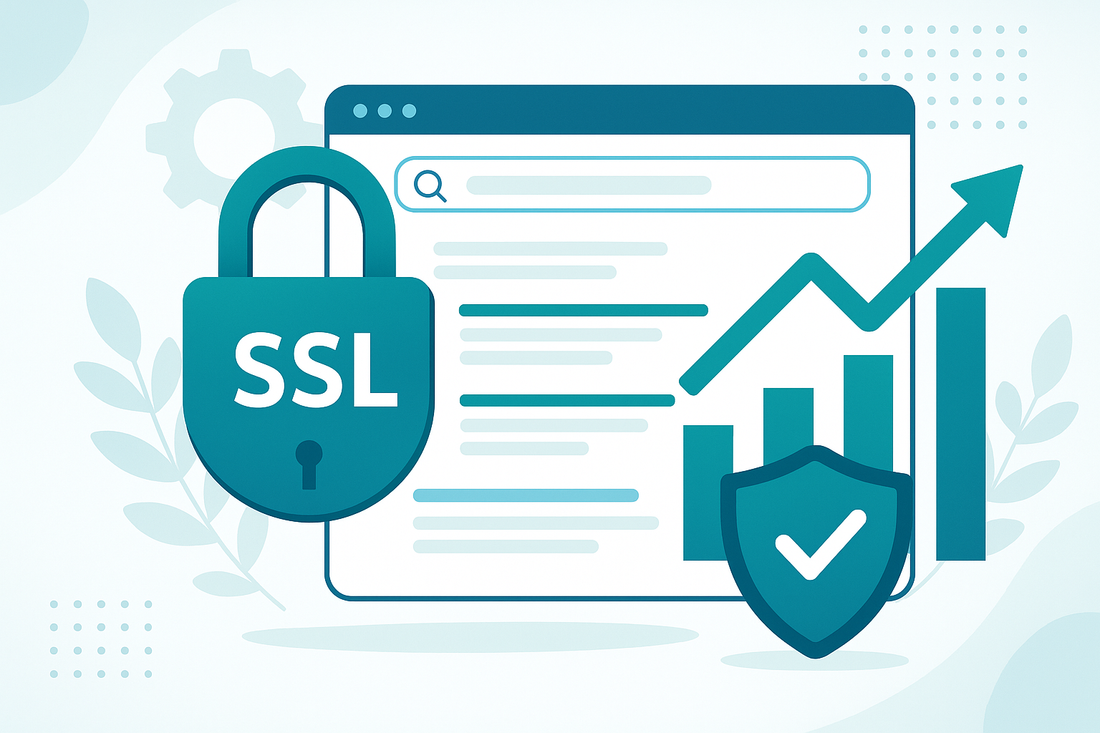
Boost Rankings & Trust - The Importance of SSL Certificates
Zane LucasShare
If you want your website to rank higher on search engines, you can't ignore one crucial factor : SSL Certificates. You might think SEO is all about keywords and backlinks, but there a hidden player that affects your site trust and ranking - SSL.
Without it, your visitors may feel unsafe, and search engines might push your site down in results. Curious how something as simple as a small padlock icon can boost your SEO and protect your visitors at the same time? Keep reading to discover why SSL Certificates are more important than you think and how they can make a real difference for your website success.
SEO Basics
SEO, or Search Engine Optimization, helps websites appear higher in search results. It is important for businesses to get more visitors from search engines like Google.
One key part of SEO is website security, especially using SSL Certificates. SSL Certificates protect users by encrypting data between their browser and the website. This security also affects SEO rankings.
Understanding SEO basics helps website owners improve their visibility and trust online. Certificate Authorities like Trustico® provide SSL Certificates that ensure both security and search engine optimization benefits.
How Search Engines Rank Sites
Search engines use complex systems to decide which websites show up first. They look at many factors to rank sites. The goal is to give users the most useful and safe results.
Relevance plays a crucial role, as search engines analyze how well the page content matches the user search query. Quality content must be original, well-written, and helpful to users seeking specific information.
User experience factors significantly impact rankings, including fast loading speed, easy navigation, and mobile-friendly design. Security represents another critical factor, as sites with SSL Certificates using HTTPS protocols receive a ranking boost because they provide safer browsing experiences.
Links from trusted sites improve a website authority and credibility. Search engines use special programs called crawlers to scan and index websites, checking the website structure, keywords, and links.
The better a site is built and secured with proper SSL encryption, the higher it can rank in search results.
Key SEO Factors
Several key factors affect SEO success, with each factor playing a role in how search engines view your site. Focus on these areas to improve ranking and user trust.
Website security through SSL Certificates is paramount, as Google prefers HTTPS sites over unsecured HTTP connections. SSL Certificates encrypt data transmission and protect users from hackers and data breaches.
Mobile optimization has become essential since more people use phones to search the internet. Sites must work well on small screens and load quickly on mobile devices.
Keyword usage involves incorporating words that match what people type in search engines. Place these keywords naturally in titles, headers, and content without overstuffing.
Content freshness requires updating your website regularly with new information to stay relevant in your industry. Backlinks from other websites signal trust and authority to search engines.
Proper implementation of these factors helps search engines trust your site. Trust leads to better rankings and more organic visitors to your website.
Role of SSL Certificates
SSL Certificates play a crucial role in SEO and website security. They protect data sent between a user browser and a website, helping build trust with visitors and search engines.
Google prefers secure websites and often ranks them higher in search results. SSL Certificates also prevent hackers from stealing sensitive information like passwords and credit card details.
Using SSL shows that a website cares about safety. This can increase visitor confidence and reduce bounce rates, supporting better SEO performance and secure user experience.
What SSL Certificates Do
SSL Certificates create a secure connection between a web server and a browser. This connection is encrypted, meaning the data is scrambled and unreadable to outsiders, keeping user information private and safe from cyber attacks.
SSL Certificates encrypt data to protect sensitive information such as passwords, credit card numbers, and personal details. They authenticate website identity by confirming that the site is legitimate and not a fake or phishing site.
These SSL Certificates improve SEO rankings since Google favors secure HTTPS websites over HTTP sites. They build user trust by displaying a padlock icon in the browser, signaling safety to visitors, and enable HTTPS protocol to ensure secure communication over the internet.
SSL Certificates protect websites from attacks such as data theft, man-in-the-middle attacks, and phishing. They help keep websites safe and trusted by both users and search engines.
Types of SSL Certificates
There are several types of SSL Certificates to fit different website needs. Choosing the right type depends on the website size and security requirements that Certificate Authorities like Trustico® offer to their customers.
Domain Validated (DV) SSL Certificates validate domain ownership only and are the quickest and simplest to obtain, making them ideal for blogs and small websites. Organization Validated (OV) SSL Certificates verify domain ownership and business identity, providing higher trust and working well for business websites.
Extended Validation (EV) SSL Certificates offer the highest validation level and display the company name in the browser bar, making them popular with large companies and e-commerce sites. Wildcard SSL Certificates secure one domain and all its subdomains, proving useful for businesses with multiple subdomains.
Multi-Domain SSL Certificates secure multiple domains with one SSL Certificate, making them good for companies managing different sites. Selecting the correct SSL Certificate ensures proper security and trust for your website visitors while supporting SEO by making your site safe and reliable.
SSL Impact on SEO
SSL Certificates play a key role in SEO. They protect data by encrypting the connection between users and websites. Search engines like Google favor secure sites. This makes SSL an important factor for ranking.
Websites with SSL Certificates show "https" and a padlock icon. These signs tell users the site is safe. Secure sites often rank higher in search results.
This section explains how SSL impacts SEO and why it matters for website owners.
Ranking Benefits
Google uses SSL as a ranking signal. Sites with SSL Certificates get a slight boost in search engine rankings. This can lead to more visitors and better visibility.
SSL Certificates help improve a website overall SEO health. Secure websites tend to rank higher than non-secure ones, and search engines may crawl and index secure sites more quickly.
Users stay longer on secure sites, reducing bounce rates. Mobile users prefer secure sites, which impacts mobile search rankings positively.
Switching to HTTPS is a simple step with great SEO benefits. Search engines reward secure sites, making SSL Certificates important for SEO success.
User Trust and Security Signals
SSL Certificates build trust with visitors. The padlock icon and "https" show that the website is safe. Users feel more comfortable sharing personal data or making purchases on secure sites.
Data encryption protects sensitive information from hackers. Authentication confirms the website identity to visitors, while visual trust signals like the padlock icon and green address bar increase confidence.
SSL Certificates help stop fake sites that steal data. Search engines notice these trust signals and secure sites often earn better rankings because users trust them more.
This creates a positive cycle of improved SEO and user experience. SSL Certificates improve security and trust, helping websites perform better in search results and leading to better engagement and SEO outcomes.
Migrating to HTTPS
Migrating a website from HTTP to HTTPS is a vital step in improving SEO and protecting user data. HTTPS uses an SSL Certificate to encrypt data between a user browser and the web server.
This encryption builds trust and helps boost search engine rankings. Search engines favor secure websites, making HTTPS migration important for any online business or blog.
The process needs careful planning to avoid traffic loss or ranking drops. Understanding the key steps and common issues can make the switch smooth and effective.
Steps to Implement SSL
Implementing SSL involves several clear steps. Each step ensures your website stays secure and search engines recognize the change.
Choose the right SSL Certificate by selecting a SSL Certificate type that fits your website needs, such as Domain Validation (DV), Organization Validation (OV), or Extended Validation (EV). Purchase and install the SSL Certificate from a trusted provider like Certificate Authorities such as Trustico® then install it on your web server using the easy SSL installation tools most hosting providers offer.
Update all website URLs from http:// to https://. Change links in your HTML, CSS, JavaScript, and CMS settings to reflect the secure protocol.
Set up 301 redirects to send all HTTP pages to their HTTPS versions. This tells search engines the pages have moved permanently and prevents loss of SEO value.
Update your sitemap and robots.txt files to list HTTPS URLs only. Submit the new sitemap to search engines to ensure proper indexing of your secure pages.
Check for mixed content by fixing any elements like images or scripts still loading over HTTP. Mixed content can cause security warnings in browsers and undermine the SSL Certificate effectiveness.
Test the site thoroughly using tools like SSL Labs or browser inspection to confirm SSL is working correctly and no errors appear.
Common Migration Issues
Several problems may arise during HTTPS migration. Recognizing these issues can help fix them quickly and avoid SEO damage.
Mixed content warnings occur when some resources load over HTTP instead of HTTPS. Browsers block or warn about these issues, harming user trust and the effectiveness of your SSL Certificate.
Broken links and redirect loops happen when redirects are configured incorrectly or internal links remain unchanged. This hurts user experience and SEO performance.
Loss of traffic can occur as search engines may take time to index HTTPS pages. Without proper redirects, traffic can drop temporarily during the migration process.
SSL Certificate errors from expired or misconfigured SSL Certificates show warnings that scare visitors away. Run a full site scan for mixed content errors and verify all 301 redirects work correctly.
Check SSL Certificate status regularly and renew if needed. Update external links and backlinks to HTTPS when possible, and monitor website traffic and rankings for any changes.
Using tools like Google Search Console helps track indexing and security issues. Fixing these problems fast protects your SEO gains and user trust while ensuring your SSL Certificate provides maximum benefit.
Measuring SEO Improvements
Measuring SEO improvements is essential after adding an SSL Certificate to your website. SSL Certificates not only protect your site but also influence how search engines rank your pages.
Tracking changes helps you see if the SSL implementation boosts your site visibility and user trust. It ensures your efforts translate into better performance and safer browsing for visitors.
Tracking Traffic Changes
One key way to measure SEO improvement is by tracking traffic changes. After installing an SSL Certificate, check if your website attracts more visitors.
Use tools like Google Analytics to monitor traffic patterns. Look for increases in organic search visits, referral traffic, and direct visits after SSL Certificate implementation.
Compare traffic data before and after SSL implementation. Pay attention to session duration to see if visitors are staying longer on your secure site.
Monitor bounce rate changes to determine if fewer visitors are leaving quickly. Track new versus returning visitors to see if new users are increasing after your site displays the secure padlock icon.
Tracking traffic changes clearly shows how SSL Certificates affect user behavior and SEO. Monitor these trends over several weeks for accurate results and meaningful insights.
Monitoring Security Warnings
Security warnings impact user trust and SEO rankings significantly. Browsers show warnings if a site lacks a valid SSL Certificate, which scares visitors away.
After adding an SSL Certificate from Certificate Authorities like Trustico® monitor your site regularly for any security alerts. Regular testing using SSL checkers helps identify potential issues before they affect users.
Check Google Search Console for security issues and review browser warnings on both desktop and mobile devices. Security warnings can include "Not Secure" messages in the browser address bar, blocked mixed content when HTTP content appears on HTTPS pages, and SSL Certificate errors due to expiration or misconfiguration.
Clearing these warnings improves user confidence and helps search engines trust your site. A secure website often ranks higher because it offers a safer browsing experience for visitors.
Regular monitoring avoids SEO penalties and keeps visitors safe. It ensures your SSL Certificate stays effective and your site remains trustworthy in search engine algorithms.
Future Trends in SEO and Security
The landscape of SEO and security continues evolving as search engines prioritize user safety and data protection. Understanding these trends helps website owners prepare for upcoming changes in search rankings and security requirements.
SEO and security are closely linked in today digital world. Websites with strong security measures, like SSL Certificates, earn trust from users and search engines. The future of SEO will focus even more on security features.
Search engines want to give users safe browsing experiences. This means securing your website is no longer optional. It is a key part of SEO strategy.
Evolving Search Engine Algorithms
Search engines keep changing how they rank websites. Their algorithms become smarter every year. They analyze many factors to decide which sites appear first in search results.
Security is becoming a bigger part of these factors. SSL Certificates are a clear signal that a website is safe. Search engines prefer sites that use HTTPS over HTTP.
Key trends in search engine algorithms include greater focus on site security and user privacy, more weight given to HTTPS-enabled websites, use of artificial intelligence to detect unsafe content, and checking for fast loading speeds and mobile-friendliness. These changes reflect how search engines prioritize user safety and data protection.
Websites that ignore these changes risk losing rankings. Adopting SSL and improving security boosts SEO and user trust.
Increased Importance of Data Protection
Protecting user data is more important than ever. People want to feel safe sharing information online. Search engines reward websites that keep data secure.
SSL Certificates encrypt data between the browser and server. This stops hackers from stealing personal details like passwords or credit card numbers. Certificate Authorities like Trustico® provide various types of SSL Certificates to meet different security needs.
Strong data protection offers several benefits for SEO including improving website reputation with users and search engines, reducing bounce rates as users feel safe, increasing chances of ranking higher in search results, and preventing penalties from search engines for unsafe sites. These advantages make SSL implementation crucial for SEO success.
Security measures that help with data protection include SSL Certificates (HTTPS), regular software updates, strong passwords and authentication, and secure hosting services. Each element works together to create comprehensive website security.
Simple steps to check if your website protects data well include verifying your SSL Certificate is active and valid, testing site speed and mobile security, using security plugins or tools, and monitoring for malware or vulnerabilities. Regular security audits ensure ongoing protection.
Data protection is no longer just a technical issue. It directly impacts SEO success and user satisfaction.
Policy and Compliance Considerations
SSL Certificates protect your website while building essential visitor trust through encrypted connections. Search engines actively favor secure sites in their ranking algorithms, providing measurable SEO benefits for websites that implement proper SSL encryption.
Websites without SSL Certificates often experience higher bounce rates as modern browsers display prominent security warnings to users. These warnings immediately signal potential risks, causing visitors to abandon sites before engaging with content or completing transactions.
Secure HTTPS connections demonstrate your commitment to data protection and user privacy standards. Certificate Authorities like Trustico® offer various SSL Certificate types to meet different security requirements and validation levels for websites of all sizes.
Installing SSL Certificates has become a straightforward process that delivers significant returns on investment. The combination of enhanced security, improved search rankings, and increased user confidence makes SSL implementation essential for modern web operations.



